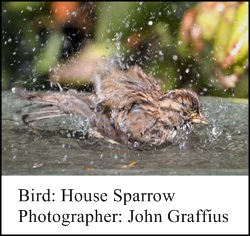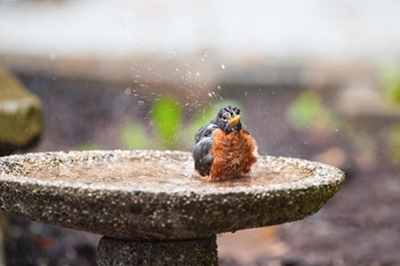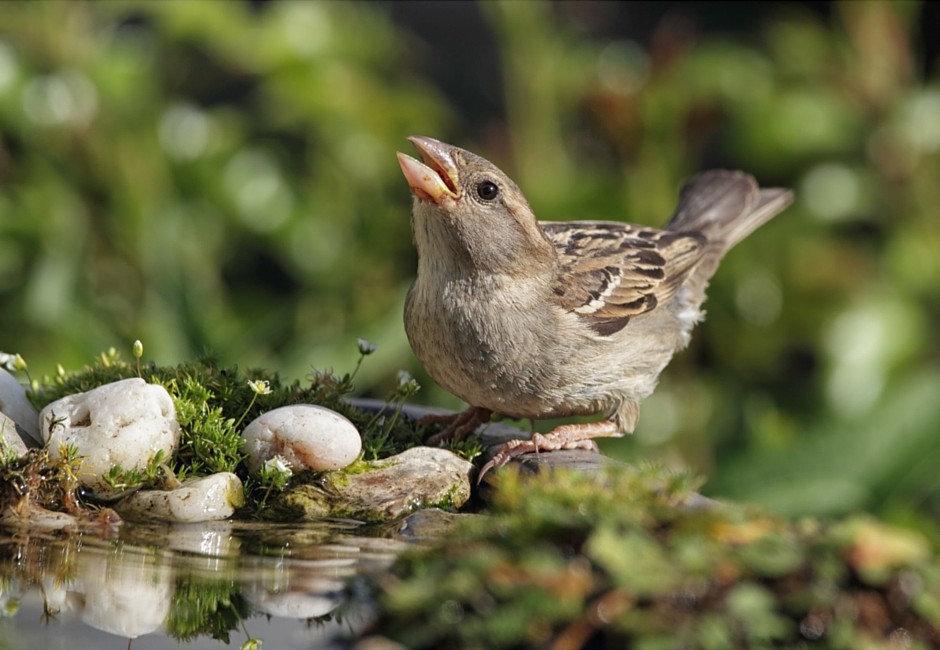During the hot and sometimes dry conditions in the summer, birds can use a reliable source of water.
We know that water is essential to all living creatures. In the case of birds, it is vitally important when it is extremely hot and a bird’s ability to regulate its body temperature can be stressed. Birds do not sweat and must remove excess body heat through their respiratory system. When the temperature rises, a bird’s respiration rate increases, sometimes to the point where it can be seen panting like a dog. Panting in this way can dehydrate a bird and increase their need for a reliable source of water to replace lost fluids.
Birds that are familiar with your yard will know where the birdbath is and take advantage of your generosity. Those birds that migrate for purposes of nesting, such as orioles and catbirds, will locate water with their sense of hearing. A moving spring will bring in birds like a magnet. By using a mister or dripper, you can entice birds more readily as they will hear the water dripping into the bowl. Misters have been known to attract hummingbirds and small migrant birds, such as warblers and vireos. They will either fly through the mist or roll in the water that has collected on leaves. Small pumps that cause the water I the bath to move will also make the birdbath more attractive to the birds that are passing by!
Birds drink water by dipping their bill into the water, holding the water in their mouth, and then tipping their head up at a sharp angle, causing the water to flow down their throat. The exceptions to this rule are doves and pigeons, which have the ability to suck water into their mouths.
Bathing serves a different purpose for birds, keeping them “groomed”. The dust and dirt are removed as you would guess, but the preening that follows afterward is essential for feathers to function at their best. As birds preen, they grasp the feather at the base with their bill and move their beak along the feather, smoothing the feather barbs so that they lock together. Any dirt or oil that remains in the feathers after bathing is removed during preening.
Robins are vigorous bathers. They take up the entire bath, dipping down into the water and throwing it over their backs with their wings. Other birds are not quite so boisterous. Chickadees approach the bath with caution and will enter from the edge. The water needs to be shallow for them to feel safe enough to actually bathe. Adding a few small rocks to the edge of your birdbath can entice smaller birds to feel safe enough to bathe as well as drink.
 Ideally, the water in the bath should be dumped out daily, and refilled with fresh water for the birds. When emptying the bowl, use a scrubber brush to clean the bowl and rinse thoroughly before refilling. This is necessary to prevent the build-up of algae and mineral deposits. Once a week, I recommend using Microbe-Lift Bath Cleaner, a soybean based liquid that you spray onto the birdbath bowl, scrub thoroughly and then let sit for a minute before rinsing with clear water. In addition, once a month your bird bath should be sterilized. After cleaning, use a solution of one part vinegar (or bleach) to nine parts water and let the solution sit in the bath for 15 minutes. Rinse very well and let sun-dry for a few hours if possible before refilling the bath.
Ideally, the water in the bath should be dumped out daily, and refilled with fresh water for the birds. When emptying the bowl, use a scrubber brush to clean the bowl and rinse thoroughly before refilling. This is necessary to prevent the build-up of algae and mineral deposits. Once a week, I recommend using Microbe-Lift Bath Cleaner, a soybean based liquid that you spray onto the birdbath bowl, scrub thoroughly and then let sit for a minute before rinsing with clear water. In addition, once a month your bird bath should be sterilized. After cleaning, use a solution of one part vinegar (or bleach) to nine parts water and let the solution sit in the bath for 15 minutes. Rinse very well and let sun-dry for a few hours if possible before refilling the bath.
There are liquid solutions that can be added to the birdbath water, designed to help prevent the buildup of stains and mineral deposits on the birdbath surface, such as white scale deposits, iron, copper and hard water stains. Microbe-Lift Bird Bath Clear is soybean based and works well for that purpose. It is not meant as a substitute for the aforementioned cleaning process (click here to order or read more about Microbe-Lift products).
Remember that there will be bird droppings in the water as birds defecate when they bathe, making the water unhealthy for them to drink. This is why it is important to make daily cleaning part of your responsibility to maintain a bird-friendly yard.
Fresh water not only benefits the birds, it prevents mosquito larvae from developing into mosquitoes. The process takes 7 to 10 days from the time a mosquito lays her eggs on the surface. Since the water needs to be stagnant for a mosquito to develop, changing the bird bath water prevents this from happening.
Offering a dependable source of water is probably the simplest thing you can do to increase the variety of birds in your yard. It can also significantly increase your enjoyment of birds as it allows you to watch their antics as they drink, bathe and preen.
Enjoy your birds!
Have you joined our email list? Click here to sign up, it’s free and gives you access to sales, coupons, nature news, events, and more!


